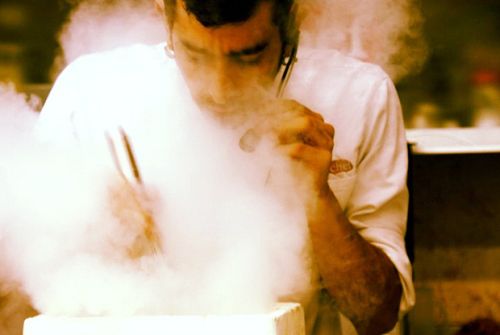Israel’s New Culinary Chemists
Aug 6, 2013

Shahar Dabbah. (Original photo Yael Maoz, photo manipulation Nurit Peled)
Over the past two decades, molecular gastronomy has changed the way influential chefs cook in many parts of the world. Thanks to a recently opened store and a soon-to-open restaurant, Israel is finally starting to catch up to this weird world of experimental cooking.
Molecular gastronomy was a term coined in 1992 by Hungarian physicist Nicholas Kurti and French physical chemist Hervé. This, is a discipline located somewhere between cooking and science, where the kitchen turns into a lab and chefs turn into mad professors, abandoning traditional food preparation in favor of using technical innovations to transform ingredients physically and chemically.
Although it didn’t catch on at first, molecular cooking first entered Israel’s culinary scene in a serious way in 2007, when Chef Aviv Moshe from Tel Aviv’s Messa restaurant returned home after eating a 35-course meal at the highly controversial and experimental elBulli restaurant near the Catalonian town of Roses, Spain—a Michelin 3-star restaurant that stood at the forefront of haute cuisine until it closed two years ago.
Even though Moshe remained hungry after 35 courses, he was inspired and felt compelled to concoct a molecular meal for his clients. Around the same time, Chef Liran Gruda prepared molecular meals at Canela Restaurant in Jerusalem, and the now defunct Barcarola Restaurant in Kfar Saba introduced molecular gastronomy to the Sharon region.
Nowadays, many upscale restaurants in Israel incorporate molecular methods into their cooking, including Catit in old Tel Aviv, and Kitchen Market, a restaurant and culinary center located over the farmers’ market in the Tel Aviv port.
Read the full article here.



